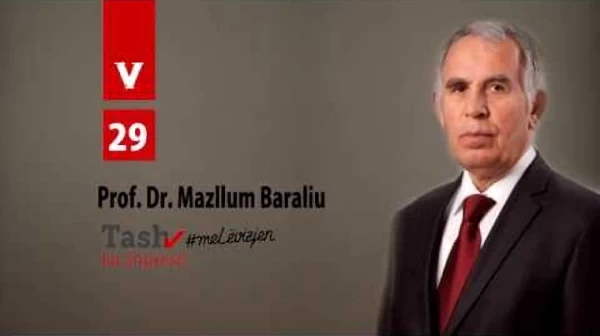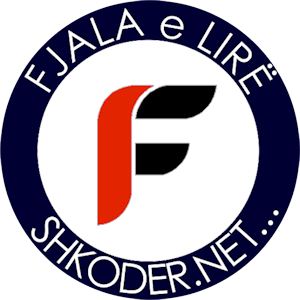BOOKS
Bz: Prof. Dr. SADRI REXHEPI
Overview of the book of Prof. Dr. Mazllum Baraliut, “Tribune and Korifenj” (Fan Noli, Gjergj Fishta and Ukshin Hoti).
The work in question by Mazllum Barali with the aforementioned title “Tribune and Korifenjë”, is a rare work of a researcher with a strong scientific background in our national jurisdiction. The work of Prof. Barali, “Tribune and Korifenj” during the reading, I came to the conclusion that the work in question should have been called “Trinomy of three geniuses” in historical memory, aware that this would be a more adequate title neatly raised on all-round intellectual, scientific activities, national, religious for the benefit of the Albanian future… The topic of the three above-mentioned geniuses is not a taboo topic, because others have written about these three geniuses before, and Prof. Baraliu has also cited them as references. but he also gave his original opinion with rich expressions regarding the evaluation of the literary opus and their national activity, who with intellectual courage put themselves at the service of protecting and preserving the Albanian national dignity and for liberation from Serbian-Montenegro slavery – Macedonian-Greek genocidal towards the Albanian being in general.
The history of this work dedicated to these three geniuses is related to our unfortunate fate in history, related to the injustices that have been done to us throughout history to the detriment of the ethnic Albanian lands annexed to Serbia-Yugoslavia and Greece in 1878, 1913, 1918, 1945, 1989 and the blackness of the Serbo-Slavic cannibalistic action against the autochthonous and freedom-loving Albanians. The annexation of Ethnic Albania was made with European-Russian diplomatic and military treaties for the interests of Serbia, Montenegro, Prof. Dr. Mazllum Baraliu is one of the best connoisseurs of legal issues in Kosovo. He has so far published many journalistic articles and several works with scientific content in several volumes. He is also known as one of the biggest reactionaries, either through the press or through various debates related to the illumination of legal issues related to the implementation of constitutionality in Kosovo.
One of the most affirmative studies of Prof. Dr. Mazllum Baraliut “Tribune and Corifenje” (Fan Noli, Gjergj Fishta and Ukshin Hoti)”, is the work in question which was published some time ago.
This author, 52 years ago, continues to contribute to the field of literary knowledge, jurisprudence and is committed to analyzing many issues of the Constitution of Kosovo…
The study work has 240 pages and is structured in three parts as well as photographs, foreword and biography of the author. From the beginning, reading Noli’s biography, I turned my memory back, I remembered the memories that Prof. Dr. Masar Kodra had after the meetings he had with Noli in the USA, as well as the documentation he had received from Noli, the correspondence he had with Noli that all constitute a chronology of historical events from his birthplace to Noli’s death in 1965. According to the data provided by the author in his book, it is clear that Noli was characterized by the unforgettable memories he had read about Albania, his inner spiritual strength, patriotic fervor, Albanianism and individual style in all his writings.
The author of this work is neither a linguist nor a linguist, but he is a literary creator and a true scholar of Kosovo’s jurisprudence. However, while reading the literature written so far, he noticed many shortcomings regarding the authentic assessment of Noli, Fishte and Hoti. Indeed, this was the reason that Barali’s approach is completely new and very dimensional. Thus, according to the author, Noli is studied in different ways as an orator, activity and activity in the field of religion, his contribution to the independence and strengthening of the Albanian Orthodox Church, Noli as a playwright, Noli as a genius and modest poet, Noli as a scientist and musician, Noli the translator, authentic and excellent Albanian speaker, Noli the devout publicist, Noli the polyglot and polemicist, evaluations of various authors who are proponents or opponents of Noli, etc. Noli was born on 6.01.1882 in Ibrik Tepe near Edrene, and he came to Albania for the first time in 1913. Among other things, Noli noticed that the main obstacles to the formation of a stable system of the Albanian state were five anarchies; as religious, social, moral, political and ideal.
And according to the author, Fan S. Noli, one of the most prominent personalities of the Albanian nation, is remembered as a great and versatile figure of Albanian literature, culture, religious life and politics. He was a man of alternatives, contradictions, internal tensions, which he overcame with the dedication of a true statesman.
Meanwhile, for the emblematic figure of Gjergj Fishta, the researcher Baraliu, after mentioning many researchers who before him were involved in the study of Fishta’s activity, he also gives his opinion, elevating his figure very high in the Albanian culture. Among other things, he also says this; “Gjergj Fishta together with De Rada, Naimi, Konica and Noli, among others, in my opinion, constitute the magical pedestal of knowledge, awareness, enlightenment and recovery and national and state consolidation in us.
In addition to the aforementioned, Fishta was a worthy follower of the tradition of Bardhi, Buzuk, Bogdan, Bud and other leaders of ancient Illyrian-Albanian literature and culture. “Researcher Baraliu brings some verses of Fishta’s poems and the opinions and evaluations of many foreign and Albanian thinkers regarding the great figure of Fishta. That everyone highly appreciates his figure. The author then also gives his personal opinion, which highly appreciates his contribution as a seal of the prominent personalities of the time.
Among those personalities that Baraliu mentions are Father Fulvio Cordignano, Gaetano Pettrota, Gabriele d’Annunzio, Eriin Stranik, Robinranat Tagora, Maximilian Lambertz, Karl Gurakuqi, Anton Baldeci, Nush Topalli, Lefter Dilo, Norbert Jokli, Father Marle Harapi, Mitrush Kuteli , Eqrem Qabej, Faik Konica, Mark Ndoja, Namik Resuli, Ernest Koliqi, Lasgush Poradeci, Aleksandër Xhuvani, Abaz Ermenji, etc., etc.
Therefore, some evaluations of some scholars about the activity of Fishta can be mentioned. Hafëz Ali Korça from his memories with Fishta gives us this impression; “I loved and respected him without limits for his inexhaustible values, as well as for his patriotism, with his persistence our ancient language found written synthesis… I can’t forget him, with how much love he hugged me and congratulated me, when we met in the great demonstration of Korça in 1910, against the Albanian alphabet with Arabic letters. Even if Father GEORGE’s patriotic activity was banned in November 1908, as much as he had done for his nation until then, it would be enough for his name to be written in golden letters.(…). Some called him the Albanian Homer and compare him with Tyrteus of antiquity, with Geto and Dante Alighieri, etc.
Meanwhile, when he talks about the biography, personality and visionary nature of Ukshin Hoti, he also analyzes his work “Political philosophy and the Albanian issue”, comparing Hoti’s thoughts with the visions of world thinkers, he also gives his personal opinion with the power of a genuine intellectual . Among other things, the author also says this; The political thought of Ukshin Hoti is a specific, avant-garde, comprehensive and exceptional scientific thought, which honors and adds value to our contemporary science and journalism. Hoti’s activity for his theoretical-doctrinal approaches and treatments are characterized by a high degree of objectivity and scientific precision; with depth, humanity, eloquence and multidimensionality of thought; with fairness, appearance and authenticity of expression, judging and acting… Ukshin Hoti was a genuine popular tribune, preacher and authentic and courageous guide of the truth for the cause; trained scientist and devout activist of Kosovo’s independence and the national issue in general.
Ismail Kadareja, Dritëro Agolli, Rexhep Qosja, Fatos Arapi, Lumturije Blakaj, Mahmut Bakalli, Ramush Tahiri, Haki Torte, Berat Luzha, Bislim Elshani, Fehmi Dalipi, Bedri Halimi, Xhevat Ademi also gave their impressions about the emblematic figure of Ukshin Hoti. Afrim Morina, Esat Stavileci, Nexhmi Rexha, Moikom Zeço, Agim Vinca, Sadri Rexhepi, Ismet Begolli, Nezir Selmani, Jakup Krasniqi, Ibrahim Gashi, Rexhep Hoti, Nazmi Misini, etc.
“I am afraid that this very high level has been the source of the misfortune that has followed step by step this martyr… (hero SR) it is unacceptable that a personality of a people, regardless of which party he belongs to or not belong, be kept on a chain. It is an insult to all that people. Stronger than ever, the Albanian nation needs skilled and high-level people. Smart people are the real princes of a nation. “Unfortunately, princes are often fatally shot,” says Ismail Kadare.
Whereas, Adem Demaçi, expresses it like this…Mr. Hoti is a dedicated advocate of democracy, human rights and peace. He uses his brilliant reason and cognition to explain the true meaning of peace and discover its roots in justice…”
Also, Dritëro Agolli states that…”Ukshin Hoti is not only a philosopher, a politician of cabinets, offices, archives, but he is a man of action, a man of struggle for a great ideal… And the fact that he is in prison and the fact that he has been in prison for a long time and does not come out of prison shows how glorious a man he is. But we Albanians, unfortunately, have a little grudge against prominent people, we don’t have that much support, sometimes we even want to displace them from politics or activity, such as the work with Ukshin Hoti…” “Ukshin Hoti is not just a patriot of books, but a great patriot, who shoulders Albania. I notice one thing, that for the release of Ukshin Hoti from prison, it was not done in Albania, neither in Albania towards the Drin, where we are, nor in Albania beyond the Drin where our brothers are”.
Therefore, Rexhep Qosja also says that “Ukshin Hoti today is a symbol of historical consciousness, conscience and invincible Albanian resistance. It is no wonder why this is the most meaningful, the most significant, the most inspiring name in our political life today. And this shows that our people value the man who is ready to make sacrifices. I want to believe that Ukshin Hoti will know how to properly maintain the national significance that his name radiates today.
And Mazllum Baraliu says: “The political thought of Ukshin Hoti is a scientific, specific, avant-garde, comprehensive and extraordinary thought, which he honored and adds value to our contemporary science and journalism. Hoti’s activity, for his theoretical-doctrinal approaches and treatments, are characterized by a high degree of objectivity and scientific precision; with depth, humanity, eloquence, and multidimensional thought; with fairness, appearance and authenticity of expressing, judging and acting… Ukshin Hoti was a true popular tribune, pedagogue-preacher and authentic guide full of truth for the cause; trained scientist and devout activist of Kosovo’s independence and the national issue in general.
While, the author of this article, expresses among other things: The determination made Ukshin Hoti to be invincible, an inspiration for the patriots who are ready to sacrifice for the freedom of the nation. About Ukshin Hoti’s determination to crown his life with the life of the nation’s freedom, Ukshin Hoti’s oath detailed in his voluminous and quite interesting work “Political Philosophy and the Albanian Issue” speaks clearly.
For the sake of scientific truth, I must state that the author published the book several years ago, with a creative spirit and with a constant intellectual courage in the service of the freedom of the nation, to give it the spirit of the demands of Kosovo at that time and of the nation in general, at a time when the vast majority of Albanians were feeling betrayed by the party and “state” “leaders” and by the divided international community, who in some cases turned a blind eye to satisfying the conquering appetites of the Serbian bloodthirsty that genocide was committed in Bosnia and Kosovo.
Therefore, the publication of this work is very important for the historiographical, literary and journalistic thought.











